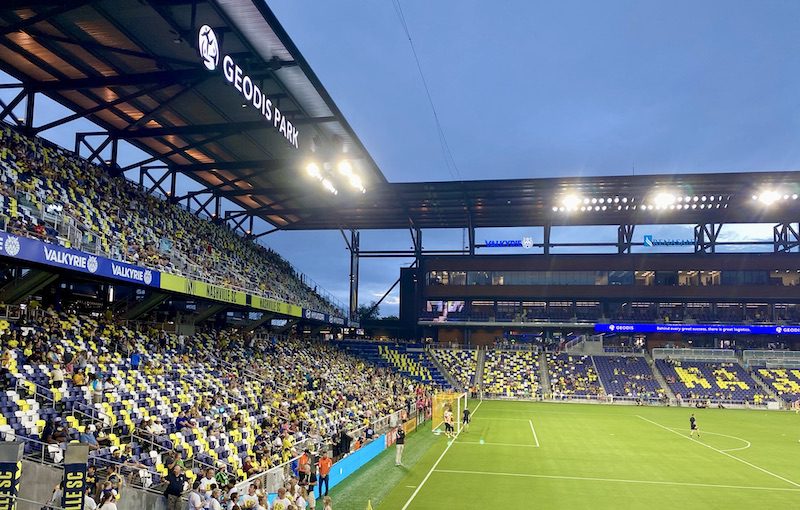I went to my first professional soccer game this past weekend. I don’t think I had seriously watched an entire soccer match since our youngest played what we lovingly referred to as “Amoeba Ball”: a tightly-knit wad of 5 year-olds shuffling up and down a field with some vague awareness that a ball needed to get to one end or the other. Cute and photo-worthy. Not particularly strategic.
Anyway, I had to admire the overall efficiency of this game. I’m more of a college football girl, so (and please don’t laugh, soccer aficionados) the fact that the action keeps moving was a revelation. Two 45-minute periods. No wasted time! I think it’s kind of neat that the clock counts up, not down. So much less stressful!
But then we got to the end…and 4 minutes were added for “stoppage time.”
OK, I get why (if you don’t, see article linked below). But I looked at the game clock, and it still said, “90:00”. Where were the four minutes? Why didn’t they get to be on the clock, too? They seemed like pretty important minutes if they prevented calling the game at the 90-minute mark.
My husband explained that the referee would keep track of those four minutes.
“Wait, what? They just let some guy on the field count the four minutes on, what, his wristwatch??” Apparently, at least at our stadium. What’s even worse, according to this article, is “The length of stoppage time is entirely what the referee believes it should be.”
Geez. It all sounded a little sketch to me.
Eventually, the whistle blew, a ball flew into the air, and much celebration ensued (Nashville defeats Austin, 3-0!). But I was still pondering those players’ unseeable, un-feelable, unknowable four minutes. Clearly, it bothered me more than it did them.
But it occurred to me that when we can’t see, feel, or know the lapse of a series of minutes or hours, or even larger units, that’s when our relationship with time becomes complicated. I want to be able to note and check in on that time, dadgummit, not leave the measurement up to someone else (or to nothing at all).
Call me a clock-watcher – I’ll own that. Maybe it’s from all those years sitting in an orchestra pit counting rests. If I didn’t count, I missed an entrance and felt a fool, and maybe didn’t get hired back. Not being in touch with the measurement of time is unsettling to me.
How much more unsettling is it to some of you who aren’t natural clock-watchers? Or calendar-viewers?
Later this weekend, my son (He of Amoeba Ball fame) checked in from his first full week of college, confessing to a bit of overwhelm. Two papers, in two different classes, are due on two different dates. Sounds simple enough, right? Well, not when you have challenges feeling, seeing, or knowing the clarity of how to spread writing them out over several weeks. Writing is not a challenge for him. Figuring out how to chunk out that writing over what seems like forever, can be.*
Right here, with this example, we have one of the significant, unsung advantages of using a planner or calendar. Or an analog clock. We can actually see the units of time, and get a sense of where we are (and are not). We can orient to the linear movement of yesterday being Sunday, today being Monday, and tomorrow being Tuesday. What things am I able to place in my time containers? What did I already put in a previous time container, and what relation does it have to now, or later?
Zoom in – right now is 8:13 am, so noon is a few hours from now. Zoom out – today is September 5 (Labor Day), my birthday was two weeks ago (eesh), and the beginning of Fall is roughly two weeks forward. The ticks of the clock in my office are an audible march through the day, and thanks to some tools of time measurement, I have a better idea of where I stand in that day.
And yes, I know we have to remember to check in with those tools. I think that if you can pull out a tape measure and figure out the length of a physical space, you can also pull out a time tool and clue into a temporal space. Unlike those soccer players, trusting the calculation and execution of their precious four remaining minutes to a referee, we can assert a little control. Our time does not have to mysteriously go missing.
This is what popped up when I searched my stock photo site for “soccer clock.” I’m going with it :-).
*Fear not – he’s a bright bulb. We’re getting it figured out.





What a captivating story! I felt the same frustration as you with the soccer players not being able to visibly see their extra four minutes. And I love how you brought that analogy forward with how we process (or don’t process) time.
Like you, I’m a clock-watcher. Or at least I’m a buzzer-setter. Sometimes I like to deeply dive into what I’m working on. So instead of actively watching the clock, I will set a timer so I can fully concentrate on what I’m doing and then ‘stop’ when it dings me.
More recently, I’ve been working on a new project (launching a workshop.) It was suggested by several people (my husband and daughter) that I create a timeline of “deliverables,” with the last one being the date of the workshop. Using the timeline I could work backwards to figure out the tasks and deadlines in between. I know this might seem odd, but it hadn’t occurred to me to do a visual timeline. Now that I have it, I can’t imagine NOT having one. And that’s so much to your point. When we can’t “see” or “feel” time, it makes it challenging to know where we are.
I’ve done the “work backward” thing before, but never created an actual visual to go with it – now I’m curious to try it! We saw a clock on a recent trip to North Carolina that was designed to show the hours in a line (across a long piece of wood) instead of in a circle like a regular clock – sort of like a clock and timeline all in one. I wondered if it would help people to see/feel/grasp time more easily? Anyway, thanks for the comment, and good luck with the workshop!
This post reminds me of conversations I’ve had with others of “our generation” who grew up with analog clocks and watches. When you look at the time, you’re not usually concerned with “what time is it right now?” but “how much time do I have until my bus comes? (or whatever you’re waiting for)” But how does this work for the younger folks who have grown up with digital clocks and watches?” I’d really like to know!
Yes, I bought a bunch of analog clocks when my kids were little. Something about them not understanding how the hands of a clock would work bothered me – I have no idea if it has helped them with their time management, but I like to think so!
A great story and a great application. I think a lot of people struggle (as you said regarding your son), not with the task itself, but with managing the task in terms of the time needed to complete it.
Thanks, Sheri – appreciate the comment.